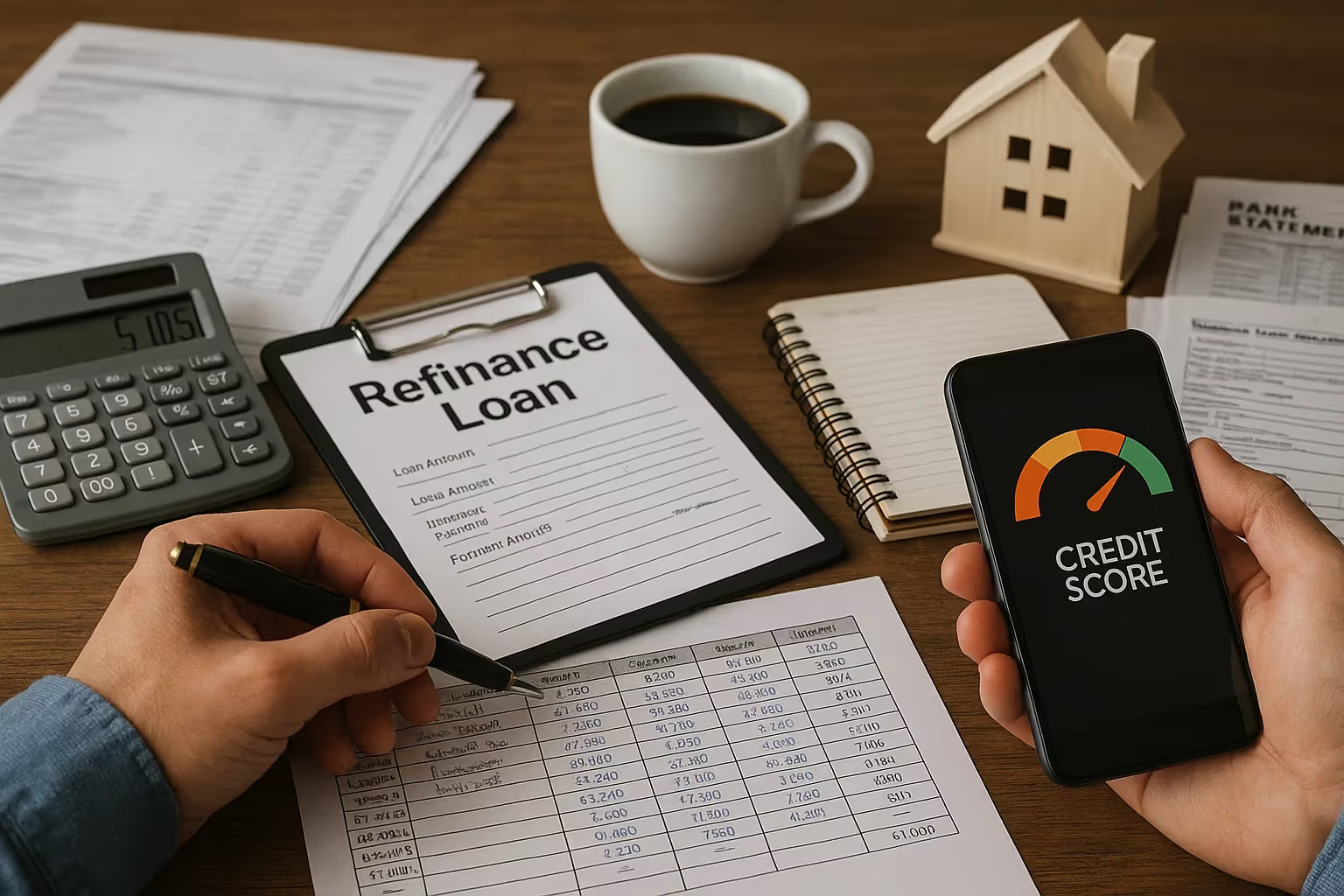.avif)
Managing multiple debts can be stressful, especially when high-interest credit cards, personal loans, and other obligations pile up. A Refinance loan can be an effective solution through debt consolidation, allowing homeowners to streamline their payments, reduce interest costs, and improve financial stability.
Debt consolidation via refinancing is not just about combining debts-it can also improve your financial health when done correctly. This article explores how refinancing for debt consolidation works, the benefits, risks, and whether it is the right option for you.
What Is Debt Consolidation Refinancing?
Debt consolidation through a Refinance loan involves replacing your existing mortgage with a new one that is large enough to pay off other debts. Essentially, you combine all high-interest debts into a single, lower-interest mortgage payment.
Example:
Imagine you have the following debts:
- Credit card: $15,000 at 18% interest
- Personal loan: $10,000 at 12% interest
- Auto loan: $7,000 at 10% interest
If you refinance your home for a larger amount, paying off these debts, your new Refinance loan might carry an interest rate of 5%. Instead of making three separate payments at higher interest rates, you now have a single payment at a lower rate.
Benefits of Debt Consolidation Through Refinancing

- Lower Interest Rates
One of the biggest advantages of consolidating debt with a Refinance loan is the potential for a lower interest rate compared to credit cards or personal loans. - Simplified Finances
Managing multiple debts can be overwhelming. Consolidating through refinancing reduces your obligations to a single monthly payment, making budgeting and financial planning easier. - Potential Savings
Lower interest rates and fewer fees can result in substantial savings over time. With a smart Refinance loan, you can pay off debt faster and save money on interest payments. - Improved Credit Score
Paying off high-interest debts through a Refinance loan can reduce your credit utilization ratio, which is an important factor in your credit score. Consistently making on-time payments on the new loan can further improve your credit rating. - Stress Reduction
Fewer bills to manage, lower payments, and a clear repayment plan can significantly reduce financial stress.
Risks of Using a Refinance Loan for Debt Consolidation
While refinancing for debt consolidation offers benefits, it also comes with risks:
- Longer Repayment Period
Extending your mortgage term to pay off debts can lower monthly payments but may increase total interest paid over the life of the loan. - Loss of Equity
Using your home as collateral means that failing to make payments could put your property at risk. Consolidating unsecured debts with a secured Refinance loan changes the risk profile. - Upfront Costs
Closing costs, appraisal fees, and lender fees can reduce the immediate financial benefit of a Refinance loan. - Behavioral Risks
Without a disciplined approach, you may accumulate new high-interest debt after consolidating existing debts, negating the benefits of refinancing.
Is Debt Consolidation Refinancing Right for You?
To determine if consolidating debt through a Refinance loan is the right choice, consider the following:
- Your Financial Goals
Are you looking to lower monthly payments, reduce interest costs, or pay off debt faster? Clearly define your objectives before pursuing a refinance. - Your Home Equity
Lenders typically require sufficient equity to approve a Refinance loan. Evaluate your home’s value and existing mortgage balance to ensure you qualify. - Your Discipline With Spending
If you are likely to accumulate new debt, refinancing may not solve your financial problems. Debt consolidation works best when paired with a strong plan to avoid new high-interest debt. - Comparison of Costs
Calculate the total costs, including closing fees and interest over time, versus the potential savings. Use online calculators to estimate the net financial benefit of a Refinance loan for consolidation.
Steps to Successfully Refinance for Debt Consolidation

- Evaluate Your Debts
List all debts, balances, interest rates, and monthly payments. Determine which debts are high-interest and prioritize them for consolidation. - Check Your Credit Score
A higher credit score may qualify you for a lower interest rate on your Refinance loan, improving potential savings. - Determine Loan Amount Needed
Calculate how much you need to consolidate debts, including potential closing costs, to avoid underestimating the new loan. - Research Lenders
Compare rates, terms, fees, and customer reviews. A careful comparison ensures you select a Refinance loan that meets your needs. - Prepare Documentation
Gather pay stubs, tax returns, bank statements, and current mortgage information to expedite the approval process. - Consider Cash-Out vs. Rate-and-Term
Decide whether a cash-out refinance to access additional funds or a rate-and-term refinance to lower interest rates is most suitable for your situation. - Calculate the Break-Even Point
Determine how long it will take to recover closing costs through monthly savings. This ensures refinancing is financially advantageous. - Finalize the Loan and Implement Your Plan
After approval, pay off high-interest debts with the Refinance loan funds. Stick to a disciplined repayment plan to avoid future debt accumulation.
Tips to Maximize Benefits
- Avoid Taking on New Debt: Consolidation only improves your financial health if you avoid accumulating additional debt.
- Focus on Paying Down the Loan Faster: Making extra payments or paying biweekly can reduce total interest paid.
- Maintain an Emergency Fund: Avoid relying solely on your home equity for emergencies, as it may affect long-term financial security.
- Review and Adjust: Periodically review your financial situation to ensure your debt consolidation strategy remains effective.
Conclusion
Refinancing for debt consolidation can be an excellent way to reduce interest rates, simplify finances, and improve overall financial health. A Refinance loan allows homeowners to combine multiple high-interest debts into one manageable payment, potentially saving money and reducing stress.
However, it is essential to weigh the risks, including longer repayment terms, upfront costs, and the potential loss of home equity. With careful planning, a disciplined approach, and proper evaluation of your financial goals, a debt consolidation refinance can be a powerful tool to regain control of your finances and achieve long-term stability.
When considering this strategy, compare lenders, understand all associated costs, and create a plan to avoid future debt. With the right execution, refinancing for debt consolidation can improve cash flow, reduce financial stress, and strengthen your financial future.

Alex Chen

Alex Chen













Get in touch with a loan officer
Our dedicated loan officers are here to guide you through every step of the home buying process, ensuring you find the perfect mortgage solution tailored to your needs.
Options
Exercising Options
Selling
Quarterly estimates
Loans
New home

Manténgase siempre actualizado sobre artículos y guías interesantes.
Todos los lunes, recibirás un artículo o una guía que te ayudará a estar más presente, concentrado y productivo en tu vida laboral y personal.





.png)
.png)
.png)
.avif)
.avif)
.avif)
.png)
.png)
.png)
.avif)
.png)
.png)
.avif)
.png)
.avif)
.png)
.avif)
.avif)
.avif)
.avif)
.avif)
.avif)